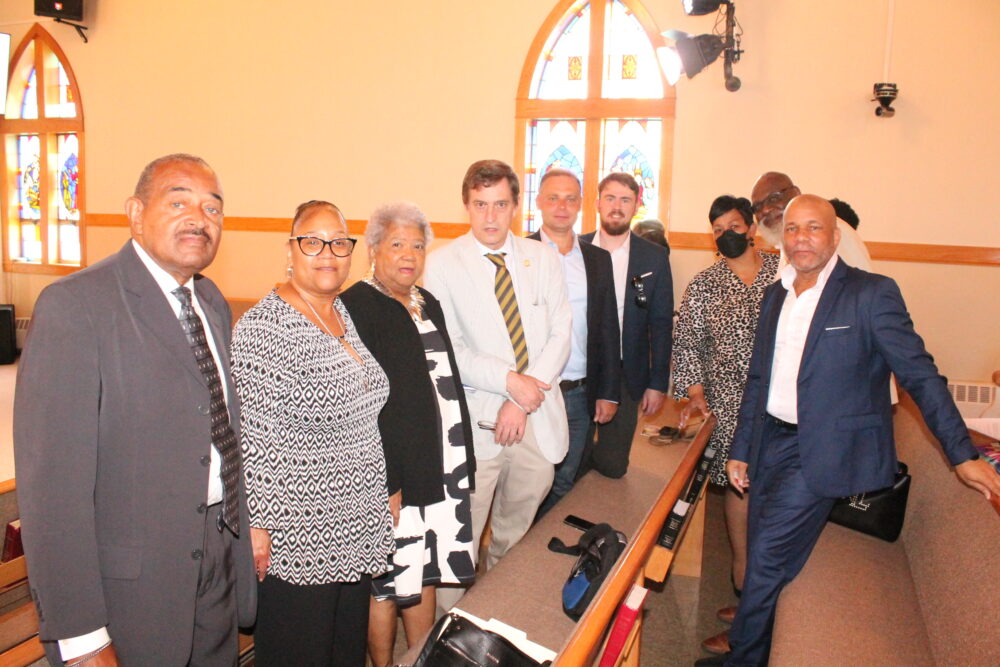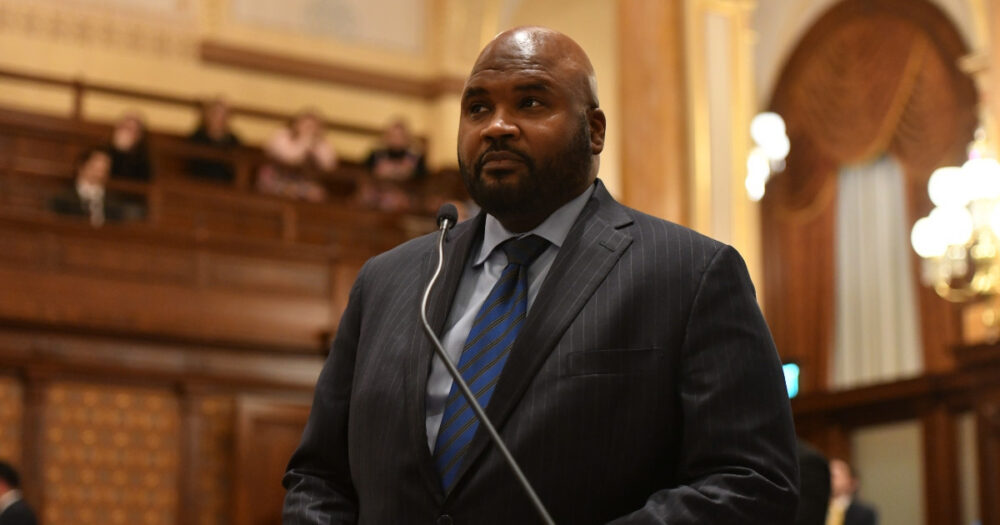Maribel Velazquez, a single mother of five living in Chicago’s Little Village neighborhood, made the difficult decision to leave her factory job in Bolingbrook this year because she couldn’t keep up with the gas prices and pay for child care at the same time, she said.
She made a little over $500 a week, but “I just didn’t know where any of the money was going,” Velazquez said as she prepared elotes on the corner of 26th Street and Millard Avenue. Instead, the mother set up a shop to sell fruit and corn, hoping to make enough to pay rent and buy food for her children. Two of the youngest ones sat on the sidewalk while she served customers last month.
Advertisement
But business wasn’t good, she said. After food prices went up, she also increased the prices of her sliced watermelon and other fruit at her own business. A mixed cup went to $9 and a single fruit cup was $8.
“Everything has gone up in price and it’s so concerning because people also don’t want to buy anything,” she said. “At least now my kids have a place to sleep and something to eat, but it gets harder every day.”
Advertisement
Though she said she receives some government aid — the Link card which is provided for her children — “I can’t keep up.”
It’s a refrain that was heard across the city well before the Federal Reserve announced Wednesday it was hiking interest rates 0.75%. The hope was that higher interest rates will help combat inflation, officials said, which in May rose 8.6% compared with the prior year.
That’s the largest 12-month increase since 1981, according to the Bureau of Labor Statistics, hitting the wallets of Chicagoans and everyone across the country as they try to keep up with everything from the price of groceries to a gallon of gasoline.
But despite rising interest rates, relief from inflation won’t come quickly, warned Phillip Braun, a clinical professor of finance at Northwestern’s Kellogg School of Management. Despite the Fed’s interest rate hike, Braun said he expects inflation to remain high throughout this year and likely well into 2023. And though he thinks the Fed move was the correct one, he said the move will almost certainly slow the economy and may even lead to a moderate recession.
Rising interest rates make it more difficult for people to borrow money, Braun said. “So people will cut back their expenditures, which leads to a slowing economy.”

People who are most affected by inflation are “also the ones who are going to be most hurt by an increase in unemployment,” he said. “It’s only going to make the situation worse for those that are struggling.”
Over the last year, the cost of food consumed at home rose nearly 12%, according to the Bureau of Labor Statistics. The prices of meat, poultry, fish and eggs increased the most — more than 14%. The cost of food away from home, including food eaten at restaurants, rose 7.4%.
And though most federal nutrition programs, such as the federal Supplemental Nutrition Assistance Program, are adjusted for inflation once per year, families who are seeing food prices surge right now won’t see their aid increased until October.
Advertisement
Chicago food pantries, which have their fingers on the pulse of hunger in the city, say they’ve seen increased demand since the beginning of 2022.
Greg Trotter, spokesperson for Nourishing Hope, the food pantry and social services organization previously known as Lakeview Pantry, said the organization was dealing with rising food prices and donor fatigue at the same time it was seeing elevated demand. Food program visits in 2022 are up almost 40% compared with the same period during the last fiscal year, Trotter said.
“We are fully bracing for this to be a long-term economic crisis for many of our neighbors in need,” he said.
Velazquez said she was grateful for the little money that she makes selling fruit and corn, and has also been moved by the efforts of community organizations in the area to provide some help for other families like hers.
Now that Velazquez’s kids are out of school, she said, “food is even more necessary, they want to eat all day.” The mother plans to find some help at a newly opened fresh market that will provide free food for families in the Little Village area.
Food insecurity levels remain elevated from pre-pandemic levels, according to a study for the Greater Chicago Food Depository by Northwestern professor Diane Whitmore Schanzenbach. But the most affected continue to be families of color with children. Some 32% of Black families and 28% of Latino families with children suffer from food insecurity, according to the data.
Advertisement
The Pan de Vida Fresh Market, which opened this week on South Lawndale Avenue, was borne out of a partnership of the New Life Centers and the Greater Chicago Food Depository. It immediately began serving some 200 families a day.

It aims to provide fresh and culturally appropriate food to the community in a dignified way. Resembling a grocery store, people can come in and pick and choose what food to take home. There are fruits, vegetables, meats and dairy.
“The impact has been massive,” said Pastor Matt De Matteo. “With prices at the pump and the grocery store, even families who have a job need help and this is a huge relief.”
Continuing economic struggles have only widened the gaps the Greater Food Depository hopes to close, its leaders said. From June 2020 to May 2022, the Greater Food Depository provided New Life with a total of 16,854,834 pounds of food at no cost to help distribute to those in need.
“It’s not just a story of more people in need; what has become clear is that the gaps have gotten wider, households with children and households of color and therefore households of color with children have gotten even more disproportionately impacted by food insecurity,” said Kate Maehr, the depository’s CEO.
And it’s not just the cost of food that’s up and causing many local families to struggle.
Advertisement
The gasoline index has increased 48.7% over the last year, according to the Bureau of Labor Statistics. According to AAA, the average price of gas in Cook County on Thursday was around $6 a gallon — 20% higher than the national average of $5 a gallon, and 10% more than the average price of gas in Illinois.
Patrick DeHaan, head of petroleum analysis at GasBuddy, said Thursday that a confluence of factors is driving up the cost of gas this month, primarily the Russian invasion of Ukraine, and increased demand from drivers arriving in the wake of shutdowns of many oil refineries during the pandemic.
“BP, ExxonMobil, Shell — all of the oil companies started hemorrhaging money with the arrival of the pandemic, because they had a massive drop in consumer demand almost overnight,” DeHaan said.

While many drivers feeling the pain at the pump are grumbling about price gouging, DeHaan said the uptick in gas prices are driven by the market, not unlike the rising home prices in the Chicago-area market being fueled by a scarcity in supply.
“You need refineries to be able to produce oil, and when you don’t have as much capacity, and there’s demand, you’re going to charge more,” he said. The sanctions against Russia — one of the world’s top oil producers — also served to reduce supply at a time when the global economy is recovering from the downturn during the pandemic, ramping up demand for oil, DeHaan said. The gas inventory in the Midwest “is at the lowest seasonal level ever,” since 1990, DeHaan added.
Auto insurance rates, too, have crept up in recent months in Illinois. The three largest auto insurers in the state — Allstate, State Farm and Progressive — have all filed for rate increases this year, after cuts and rebates in the early days of the pandemic. Among the reasons for the rising premiums are increased prices for new and used cars, supply chain disruptions, a labor shortage and rising medical costs, industry analysts have said.
Advertisement
In one example, State Farm recently filed for a 3% increase with the state’s Department of Insurance that was set to take effect Monday, following a 4.7% increase in March. Combined, the two increases mean State Farm customers will pay about $59 more to insure each vehicle per year.
Public transit agencies have sought to capitalize on rising gas prices to encourage travelers and commuters to turn to trains and buses instead of cars.
Metra and CTA officials said ridership on both systems has been rising this year. Gas prices likely are playing a role, though there’s no way to measure how gas prices compare to other factors driving an uptick in riders, such as summer events or the return of workers to offices at least a few days a week, they said.
Meanwhile, local families will be left to sort out all of the recent price increases, both for basic needs such as food and transportation — and the pressure that comes with them.
Evelyn Figueroa, director of the Pilsen Food Pantry, said that facility has had to triple its food budget compared with a year ago. At the same time, demand began to rise at the food pantry in February and has remained elevated since then, she said.
“The people that the economy affects the most are going to be low-income households, low-income families,” said Figueroa, who is also a professor of clinical family and community medicine at the University of Illinois at Chicago, “because they don’t have a safety net.”
Advertisement







